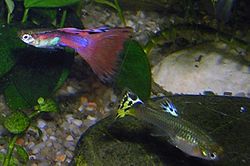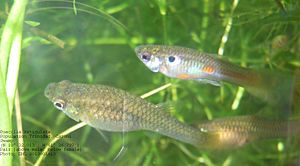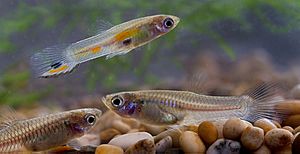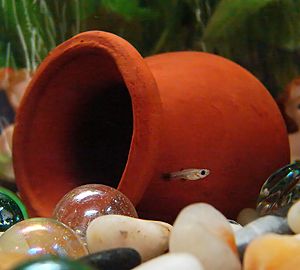Guppy facts for kids
Quick facts for kids Guppy |
|
|---|---|
 |
|
| Guppy male and female | |
| Scientific classification | |
| Kingdom: | |
| Phylum: | |
| Class: | |
| Order: | |
| Family: | |
| Genus: |
Poecilia
|
| Binomial name | |
| Poecilia reticulata Peters, 1859
|
|
The guppy is a small, colorful fish known by fun names like millionfish and rainbow fish. It's one of the most popular aquarium fish in the world and lives in warm, tropical waters.
Contents
Where Guppies Live
Guppies originally come from places like Trinidad and Tobago, Venezuela, and other islands in the Caribbean. But guess what? People have introduced them to almost every continent except Antarctica! You'll often find them swimming in smaller streams and calm pools, rather than big, fast rivers.
What Guppies Look Like
Wild female guppies are usually grey. But male guppies are super colorful! They have bright splashes, spots, or stripes in many different colors. Guppies are small fish. Males are usually about 1.5 to 3.5 centimeters (0.6 to 1.4 inches) long. Females are a bit bigger, growing to about 3 to 6 centimeters (1.2 to 2.4 inches) long.
Guppy Life Cycle
In the wild, guppies can have two or three generations of babies each year. When baby guppies are born, they are already well-developed. They can swim and take care of themselves right away! Young guppies like to swim together in groups.
Female guppies start having babies when they are about 10 to 20 weeks old. They can keep having babies until they are about 20 to 34 months old. Male guppies grow up faster, becoming mature in 7 weeks or less. In the wild, guppies usually live for about 2 years.
What Guppies Eat
Wild guppies eat many different things. They munch on tiny plants called algae, small water bugs, and even bits of plants and minerals. Algae is often the biggest part of their diet. What they eat can change depending on what food is available where they live.
Guppies often look for food in groups. This helps them find food more easily. But it also means they have to share their snacks with their friends!
Guppy Reproduction
Guppies are special because they are livebearers. This means the female guppy gives birth to live babies, instead of laying eggs. It's pretty cool! The babies grow inside the mother for about 21 to 30 days. A single female guppy can have anywhere from 20 to 200 baby guppies, called fry, at one time. This is why they are so successful in the wild and in aquariums.
Who Hunts Guppies?
Guppies have many animals that try to eat them, like bigger fish and birds. Some common predators in the wild are Crenicichla alta, Anablepsoides hartii, and Aequidens pulcher. Guppies are small, and the colorful males can be easy to spot. Like many fish, they often swim together in groups to try and avoid being eaten.
Guppies in Aquariums
If you have guppies in an aquarium, they like hard water. The water temperature should be between 25.5 and 27.8 degrees Celsius (78 and 82 degrees Fahrenheit). They also like a little bit of salt in their water, about one tablespoon for every 5 US gallons (19 liters).
It's important to change the water regularly to keep it clean and healthy for them. Guppies are omnivores, which means they eat both plants and animals. You can feed them fish flakes or pellets. Sometimes, you can give them special treats like live or frozen bloodworms or daphnia.
Guppies should not be kept alone in an aquarium. Both males and females like to swim in groups, just like they do in the wild.
Fun Facts About Guppies
- Guppies can live for 2 to 3 years, and sometimes even longer if they are well cared for.
- Male guppies are usually more colorful than females. They use their bright colors to attract mates.
- Guppies are schooling fish, which means they prefer to live in groups.
- Guppies have 23 pairs of chromosomes, including one pair of sex chromosomes. Humans have the same number!
Images for kids
See also
 In Spanish: Guppy para niños
In Spanish: Guppy para niños
 | Tommie Smith |
 | Simone Manuel |
 | Shani Davis |
 | Simone Biles |
 | Alice Coachman |








